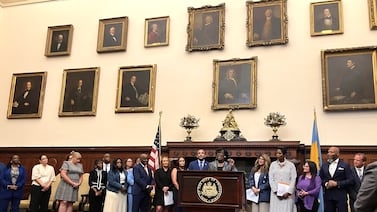Sign up for Chalkbeat Colorado’s free daily newsletter to get the latest reporting from us, plus curated news from other Colorado outlets, delivered to your inbox.
Some Colorado lawmakers are worried about the growing role of private equity firms in the child care market. They proposed a bill in January to put new guardrails on child care chains backed by such investors, who they say are driven by profits.
But in the space of a few minutes and a couple amendments Tuesday, the legislation changed dramatically. Now, the guardrails would apply to all child care providers, not just those backed by private equity or venture capital firms.
It’s not what the bill sponsors wanted, but it keeps the bill alive so debate can continue. House Bill 25-1011 advanced out of the Senate Business, Labor, and Technology Committee in a 4-3 vote Tuesday.
“We’re not fans of where the bill is at the moment,” Sen. Cathy Kipp, one of the bill’s sponsors, said Wednesday.
The next step is for lawmakers to hammer out the differences between the newly amended bill and the version passed earlier by the House, which retains the original focus on private-equity backed child care chains. If they can’t agree, the legislation may die.
While the bill’s ultimate shape and fate is unclear, it represents the first time Colorado lawmakers have considered potential problems posed by private equity firms that buy or invest in child care centers. It’s an issue lawmakers in other states, including Massachusetts, Vermont, and New Jersey, have acted on in recent years.
Experts say private equity backing can hurt child care quality, raise prices for families, and send public dollars meant for classrooms into the pockets of wealthy investors. But leaders of large chains backed by private equity firms say they provide many desperately needed child care seats and that new guardrails would chill investment in Colorado’s child care industry at a challenging time.
The bill considered at Tuesday’s hearing would have required child care chains with private equity backers to publicly post their tuition prices and fees. They also would have required 60 days’ notice to families and staff members before staff layoffs or enrollment changes following a center’s purchase by a private-equity backed chain.
About 15% of child care seats for young children in Colorado are housed in centers with private-equity backing or ownership, according to a Chalkbeat analysis. These include well known chains like KinderCare, Primrose Schools, Goddard Schools, The Learning Experience, and brands owned by the Learning Care Group.
Experts say some big child care companies make double digit profits, while many mom-and-pop programs earn just 1% to 2%.
Private equity firms, which have a stake in industries ranging from health care to rental housing, typically use a little of their own money plus loans and funding from big investors to buy companies they aim to sell at a profit later, usually within three to seven years.
Before the amendments were added to the bill at Tuesday’s committee hearing, several opponents of the legislation argued that it unfairly singled out certain child care centers because of their ownership structure.
David McMurtry, who with his wife owns a Goddard School location in Denver, said, “While our franchise school may technically fall under the definition outlined in this bill, we are not a corporate entity detached from the children and families.”
He described being involved in the daily work of running the center, including comforting a child who had a medical emergency on the playground and powerwashing the side of the building.
“It is incredibly misleading to state that child care programs not backed by institutional investors are exempt from profit maximization,” he told the committee.
But supporters of the bill say chains backed by private equity firms are fundamentally different from other child care businesses and should be treated as such.
“While the frontline staff at chain programs work just as hard as those at any other programs, and the programs can be high quality, the companies have [a] unique profit maximization motive,” said Elliot Haspel, a senior fellow at the think tank Capita who’s written extensively about private equity in child care.
That’s because private equity owners are ultimately beholden to their investors, not the best interest of staff, students, and families, he said.
He cited the example of Guidepost Montessori, a national chain that in February abruptly announced the closure of all five of its Colorado locations, leaving hundreds of families scrambling for alternative arrangements. Leaders at the chain, which is backed by venture capital, another type of investor covered by the proposed Colorado legislation, cited financial problems for the closures.
State officials don’t currently track whether child care centers are owned or backed by private equity or venture capital firms. In fact, officials from the Department of Early Childhood told the committee on Tuesday that they wouldn’t have the ability to enforce the law if the version focusing on private equity-backed chains passes.
Kendra Dunn, deputy director of the department’s office of program delivery, said the bill gives the department authority to take disciplinary action if private equity-backed providers don’t comply with its provisions, but said that job falls outside the department’s scope and expertise.
The department, “does not have the necessary infrastructure in place to support this legislation,” she said.
Ann Schimke is a senior reporter at Chalkbeat, covering early childhood issues and early literacy. Contact Ann at aschimke@chalkbeat.org.







